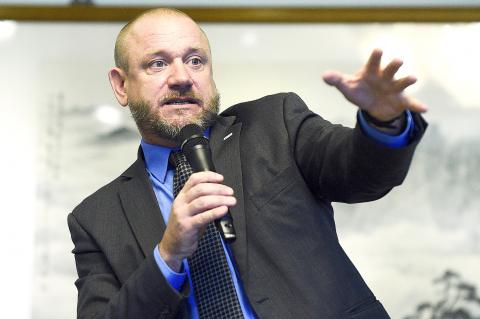False information in Taiwan spread by foreign governments has increased from 2011, Sweden-based academic Staffan Lindberg said in Taipei yesterday, adding that it is important for media to fact check stories to counter the trend.
A political science professor at the University of Gothenburg, Sweden, Lindberg was invited by the Ministry of Foreign Affairs to talk about misinformation in Taiwan based on exerience as director of global research project Varieties of Democracy (V-Dem): Global Standards, Local Knowledge.
The project involves nearly 3,000 experts across 180 countries. Its headquarters are at the university’s V-Dem Institute.

Photo: Chen Chih-chu, Taipei Times
In their research, Lindberg said they found that Taiwan had been besieged by the most false information disseminated by foreign governments in the past few years, followed by Latvia, Bahrain, Qatar, Hungary, Yemen, Kosovo and Syria, as well as other countries.
False information can be defined as information “factually or documentarily untrue,” but some gray areas exist on the true-untrue spectrum, he said.
The amount of misinformation in Taiwan increased in about 2011, he said, adding that China is a “possible suspect” due to its authoritarian control of information.
Taiwan’s government cannot just shut down the Internet, yet the Chinese and Russian governments can, making democratic countries more susceptible to misinformation attacks, he said.
Regarding the level of government dissemination of false information domestically and abroad, China is placed in the “extremely often” category; Taiwan and Japan in the “rarely” category; and the US between the “half the time” and “rarely” categories, he said.
Lindberg said reporters should work harder to check facts before publishing news, especially as social media has become a major source.
There are also fake scientific journals publishing unreliable papers to sway public opinion about issues such as climate change, he said, advising journalists to check with third-party experts before citing a paper.
Governments should work with social media firms to keep false information from circulating, he added.
On Thursday, Lindberg also gave a speech at National Taiwan University’s Department of Political Science.

A strong continental cold air mass is to bring pollutants to Taiwan from tomorrow, the Ministry of Environment said today, as it issued an “orange” air quality alert for most of the country. All of Taiwan except for Hualien and Taitung counties is to be under an “orange” air quality alert tomorrow, indicating air quality that is unhealthy for sensitive groups. In China, areas from Shandong to Shanghai have been enveloped in haze since Saturday, the ministry said in a news release. Yesterday, hourly concentrations of PM2.5 in these areas ranged from 65 to 160 micrograms per cubic meter (mg/m³), and pollutants were

Taiwan’s armed forces have established response protocols for a wide range of sudden contingencies, including the “Wan Chun Plan” to protect the head of state, the Ministry of Defense (MND) said today. After US President Donald Trump on Saturday launched a series of airstrikes in Venezuela and kidnapped Venezuelan President Nicolas Maduro, concerns have been raised as to whether China would launch a similar “decapitation strike” on Taiwan. The armed forces regularly coordinate with relevant agencies and practice drills to ensure preparedness for a wide range of scenarios, Vice Minister of National Defense Hsu Szu-chien (徐斯儉) told reporters before a

EVA Airways on Saturday said that it had suspended a pilot and opened an investigation after he allegedly lost his temper and punched the first officer several times as their plane was taxiing before takeoff at Los Angeles International Airport. According to a report published on Thursday by The Reporter, the incident occurred after the flight’s Malaysian first officer tried to warn the Taiwanese pilot, surnamed Wen (文), that he was taxiing faster than the speed limit of 30 knots (55.6kph). After alerting the pilot several times without response, the first officer manually applied the brakes in accordance with standard operating

Japanese Councilor Hei Seki (石平) on Wednesday said that he plans to visit Taiwan, saying that would “prove that Taiwan is an independent country and does not belong to China.” Seki, a member of the Japan Innovation Party, was born in Chengdu in China’s Sichuan Province and became a naturalized Japanese in 2007. He was elected to the House of Concilors last year. His views on the Chinese Communist Party (CCP) — espoused in a series of books on politics and history — prompted Beijing to sanction him, including barring Seki from traveling to China. Seki wrote on X that he intends